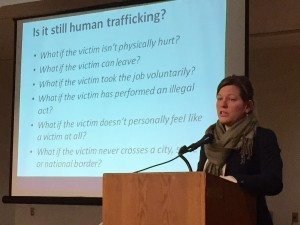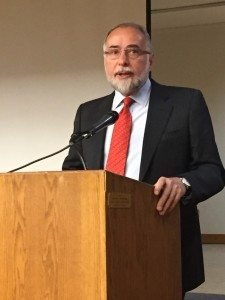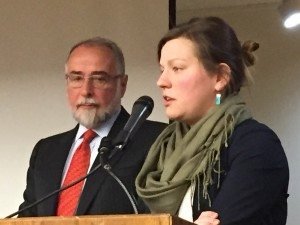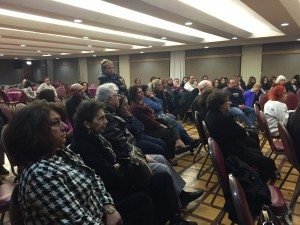By Georgi-Ann Oshagan
DETROIT, Mich.—The Armenian Relief Society (ARS) “Maro” Chapter of Greater Detroit hosted a town hall meeting to learn and explore the dynamics of human trafficking in Michigan, Armenia, and throughout the former Soviet Union and Middle East. The event was held on Feb. 27 at St. Sarkis Armenian Apostolic Church Lillian Arakelian Hall. Guest speakers were University of Michigan Law School Professor Elizabeth Campbell and author Vahan Zanoyan.

St. Sarkis Church Pastor Rev. Fr. Hrant Kevorkian opened the evening with a prayer. Chapter chair Simone Topouzian welcomed the crowd and introduced the event topic as important and worthy of attention.
“Tonight is an opportunity to raise our own awareness of a terrible trend occurring locally and internationally,” said Topouzian. “Human trafficking is yet another tragic obstacle for not only Armenians, but also for all people to overcome.”
“Maro” Chapter Executive Board secretary and event co-chair Alidz Oshagan introduced Campbell, a clinical assistant professor of law at the University of Michigan Law School Human Trafficking Clinic. Campbell’s research and teaching centers on human trafficking, immigration, domestic violence, and criminal law. She is a member of the Michigan Human Trafficking Taskforce.
Although Michigan is known to be a state with a high rate of human trafficking, Campbell noted that the real number of trafficking victims is unknown.
“We don’t have good statistics for Michigan, for the United States, for the world,” she said. “It’s out there. We don’t know how much, but it’s out there and we have to stop it.”
Human trafficking victims in the metropolitan Detroit area hail from a variety of areas, including east and west Africa, Russia, and Asia.
“It’s pretty much coming from everywhere,” said Campbell.
Human trafficking exploitation falls into two general categories: labor and sex. Campbell noted that most of the University of Michigan Law School’s Human Trafficking Clinic clients are victims of labor trafficking. These victims are of all ages and can be found working mostly at restaurants, construction sites, nail salons, and hair-braiding establishments. Other victims find themselves locked into domestic servitude in the home of the trafficker or “buyer” of the trafficking victim.
Campbell outlined the process that is used to lure vulnerable people into the trafficking world—a process that preys on the victim’s desire to escape poverty or undesirable family circumstances for a better life.
The victim is recruited by force, fraud, or coercion. The “chains” on the victim are normally psychological, not physical. “I have not had a client who was shackled,” said Campbell.
Campbell also explained that many assume that “trafficking” involves long-distance travel between the home of the trafficking victim and their destination, but long-distance movement isn’t necessary for trafficking.
“You can be trafficked on the block you were born,” said Campbell, adding that the essential element of trafficking is exploitation. “They have multiple forms of trauma when they come to me,” she added about her clients. “The common denominator in my clients is vulnerability.”
Campbell related 2 major cases she recently worked on, that of 19-year-old Tina of Romulus, Mich., and 15-year-old Ben of Ypsilanti, Mich., by way of Ethiopia, whose parents had trusted a well-respected member of their community to ensure that Ben would receive a good continuing education in the United States.
Tina, the native Michigander, struggled as a victim of sexual trafficking for several years, while Ben was a model student who was a victim of domestic servitude under the control of his “patron.” Both victims were ultimately freed from their imprisonment through the University of Michigan’s Human Trafficking Clinic.
The human trafficking story continued with Zanoyan, who was introduced by ARS “Mar”o Chapter member and

event co-chair Meline Topouzian.
Zanoyan, a global energy consultant, tapped into his experiences meeting young Armenian sexual trafficking victims to speak out against the crime through fiction. Zanoyan’s first novel, A Place Far Away, was published in 2013, sparked by a chance encounter he had with a 16-year-old Armenian sex trafficking survivor he met in Dubai. The second novel, The Doves of Ohanavank, published last year, continues the story of the first novel’s fictional heroine, Lara Galian.
While Campbell related the legal basis for human trafficking and discussed the process for victims to be vindicated through the criminal justice system, Zanoyan focused on sexual trafficking victims from Armenia and other areas of the former Soviet Union who find themselves far from home and victims of exploitation.
“This is not an Armenian phenomenon,” Zanoyan emphasized. “It’s a global phenomenon.”
Zanoyan framed human trafficking as a social issue in Armenia, beginning with the collapse of the Soviet Union. Social and economic supports disappeared and other local conditions created an environment conducive to luring young Armenian women into a world of sex trafficking.
“In Armenia, [the post-Soviet Union conditions] were worse because you had the Karabagh War and people going to work in Russia and leaving their families,” Zanoyan explained. “You had the most fertile ground for this [trafficking] activity to occur.”
Zanoyan conducted research for his first book by interviewing 12 Armenian sex trafficking victims in Dubai. The

heroine of his novels is a composite of those interviewed.
Zanoyan compared his literary advocacy against human trafficking to Campbell’s legal work.
“Why novels?” he asked. “I am convinced there’s no substitute for a lot of continued noise on this matter. The [Armenian] government does not make this a priority at all. Without public outcry, nobody cares. Mixing the victim with the criminal is chronic. In that severe poverty, they’re dying for a promise.”
Zanoyan and Campbell both advocated more discussion for a greater understanding of the crime of human trafficking and its victims. Audience members were urged to remain interested and ra

“It’s too shameful. It’s too painful,” Zanoyan noted. “We think, ‘Let’s not talk about it.’ Your silence to this issue means you are an accessory to the crime. Public awareness is critical to make government more diligent in doing its job. And awareness and noise matter, but it has to be constant.”
The ARS “Maro” Chapter is selling copies of Zanoyan’s books for $20 each. Zanoyan donates all sales proceeds to various non-profit organizations in Armenia that fight human trafficking or serve as a safe haven for vulnerable young people and children.
Books are available by contacting a “Maro” Chapter member. More information about this local, national, and global issue can be found online at www.acf.hhs.gov/trafficking and through the National Human Trafficking Resource Center by calling (888) 373-7888.



Not only has human trafficking become as common as drugs it is only second to drug in its profits Good Work we need to keep this in the media limelight IT MUST NOT BE TOLERAYED AND PEOPLE MUST BE EDUCATED ON THIS MATTER